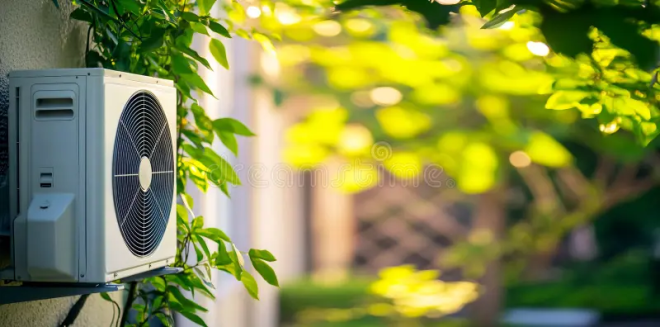

What if your gas heat pump fails just when your family needs comfort most? You could be sweating in summer or shivering in winter, and repairs could take weeks to arrive.
That’s why it’s important to maintain it properly, so that your family stays warm. Skipping regular check-ups means risking costly repairs.
But why do heat pumps require a high amount of servicing? We’ll explain the reasons and share a simple routine to keep your family comfortable. Read on!

A gas heat pump is a system that uses natural gas as its main energy source to help you control your home’s temperature just the way you want it.
Like a furnace, it burns natural gas and moves heat around from outside air, combining combustion with heat transfer technology for greater efficiency.
How does it work? Basically, it uses a special fluid called refrigerant that moves between the outdoor and indoor units.
The refrigerant changes from liquid to gas and back to liquid as it absorbs heat from outside air and releases it inside your home, or vice versa for cooling.
And the system can both warm and cool your home because of an important part called a reversing valve. Its job is to change the direction that the refrigerant flows.
Simply put, the valve controls which unit absorbs heat and which releases it. This simple switch lets the system serve as a heater in winter and an air conditioner in summer.
In heating mode, the gas heat pump uses a gas engine to run a compressor. The compressor squeezes refrigerant, which absorbs heat from outside air and turns into a gas. It then boosts the refrigerant’s temperature and pressure before releasing heat inside.
In cooling mode, the refrigerant absorbs heat from the indoor air, cooling the room. It then carries the heat outside, where a fan blows it away.
To make sure both processes work well, it’s important to take good care of the gas heat pump with regular checks from a gas heater installation expert. But why is that?
Gas heat pump maintenance and service are important for these reasons:
One of the main reasons why heat pumps require a high amount of servicing is that they run all year round, whether for heating in the winter or cooling in the summer.
A gas heat pump switches modes often to match the seasons, which stresses parts like compressors and fans. This increases the risk of breakdowns or overheating.
In winter, cold outdoor air makes it harder for heat pumps to gather heat. In summer, extreme heat can challenge their cooling ability.
Heat pumps move air in your home, and air filters are vital as they trap dirt, dust, and tiny particles before circulation.
If you don’t do gas heat pump maintenance, dirt and particles can build up inside. Over time, this reduces the filters’ ability to work effectively.

As a result, the heat pump has to work harder to move air through, which lets more allergens and pollutants escape. This can cause allergies and breathing problems.
A gas heat pump has a compressor, fans, coils, refrigerant lines, a reversing valve, and electrical parts. Over time, wear and tear can reduce its efficiency.
Dust can build up, parts may break, refrigerant levels can drop or shift, and electrical connections can loosen. If ignored, these problems can cause overheating or system shutdown.
This can lead to emergency repairs that may cost over $1,000. Therefore, regular maintenance is important to prevent costly repairs by addressing small problems before they worsen.
You need to do regular maintenance on your gas heat pumps to keep them working well, which helps save money on energy bills.
Remember, a heat pump works by moving heat, not generating it. Its performance depends on the condition of its parts.
When filters, coils, and fans are clean, the heat pump runs smoothly and uses less electricity to maintain your home’s temperature. This can lower your monthly bills.
On the other hand, if the parts are dirty or blocked, the pump has to work harder to move heat, which uses more power and can cause it to wear out faster.
Never take your safety for granted. Regular servicing of heat pumps is important to keep them running safely and in compliance with safety codes.
These systems are complex and contain many parts, like mechanical elements. Any malfunction in these parts can be dangerous.
For example, cracks in a heat exchanger can let dangerous carbon monoxide gas leak into your home, which can be very harmful, especially for kids and older people.

Also, electrical connections can become loose over time, which can increase the chance of fires or electrical shocks.
What if your gas heat pump fails when you need it most? The last thing you want is to experience outages during extreme temperatures, right?
That’s why heat pumps require a high amount of servicing. You don’t want worn-out components or low refrigerant levels to prevent your system from keeping the right temperature.
Think about it. When it’s really hot or cold outside, your heat pump has to work harder to keep your home comfortable. In such conditions, heat pump performance can drop.
But keeping up with regular gas heat pump maintenance can help avoid surprise breakdowns during hot summer days and cold winter nights.
Constant use wears down any machine. But good maintenance can help it last longer, including a gas heat pump.
A gas heat pump typically lasts 15-20 years, depending on the model. But if you skip regular maintenance, the lifespan can be drastically reduced.
And, ignoring routine servicing lets small issues slide, which can turn into bigger problems. Remember, the efficiency of the heat pump also affects how long it lasts.
Don’t worry, most companies give a warranty on your heat pump as long as you do regular maintenance. This information is usually in the warranty details.
The warranty often covers important parts, like the compressor. This helps protect you from high repair bills.
But if the company finds out that you skipped maintenance and that’s why something broke, they may refuse to fix it for free. This way, you’ll have to pay for everything yourself.
You know all the reasons to do the gas heat pump maintenance. But do you know what things you should check?

Gas heat pumps are great systems that offer both heating and cooling. But, this versatility comes at a cost if you ignore regular maintenance.
Because of the gas combustion process, heat exchange components, and year-round use, these units need consistent professional care to keep running reliably and efficiently.
While simple tasks like replacing filters are easy to do yourself, gas heat pumps have technical components that are best left to the professionals.
We hope this information helps. Don’t wait for your system to fail during the worst weather. And contact Melbourne Gas Plumbing today to schedule routine maintenance, especially if it’s been a while.


Fill the form below and we’ll get back ASAP!

MGP! Thank you for help, honest pricing and high quality work. Thank you to Joe for pricing and the boys involved for replacing my hot water tank and fixing my gas leak for a reasonable price. 5 star response, 5 star service and 5 star price.
Joe was great. Very professional and quick. Gas hot water heater needed replacing, he was honest and upfront about what our options were. System was sourced and replaced within a couple of hours.
Fantastic service very responsive Joe is highly recommended and works very clean and neat..... good job well done....very happy... will use again and again

At Melbourne Gas Plumber, we're here to handle all your gas plumbing needs throughout Melbourne. With over 40 years of experience, we bring extensive local knowledge and expertise to every job.
QUICK LINKS
OPENING HOURS
Open 24/7
